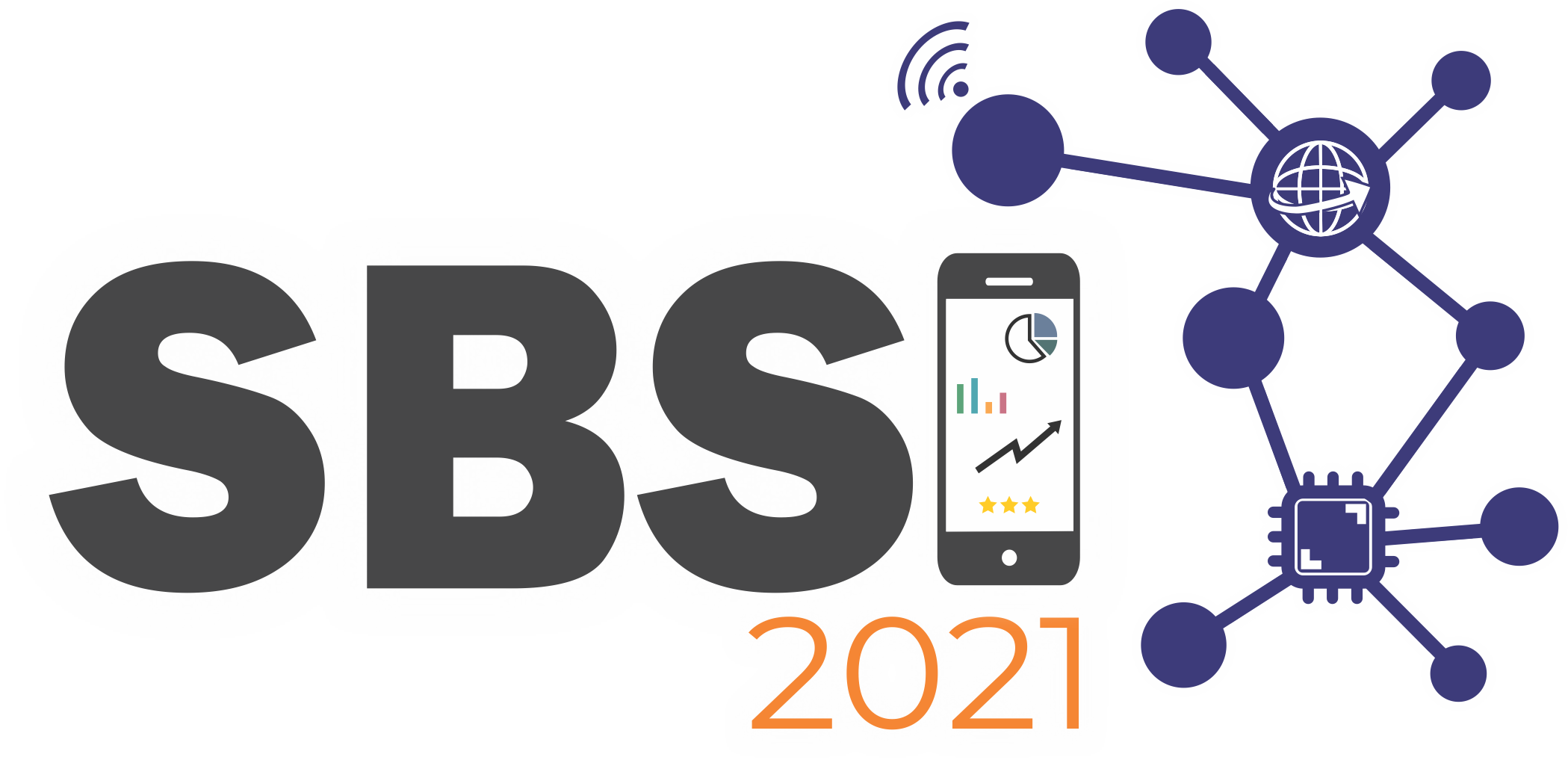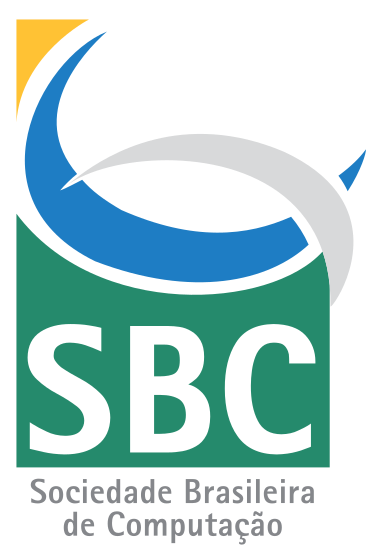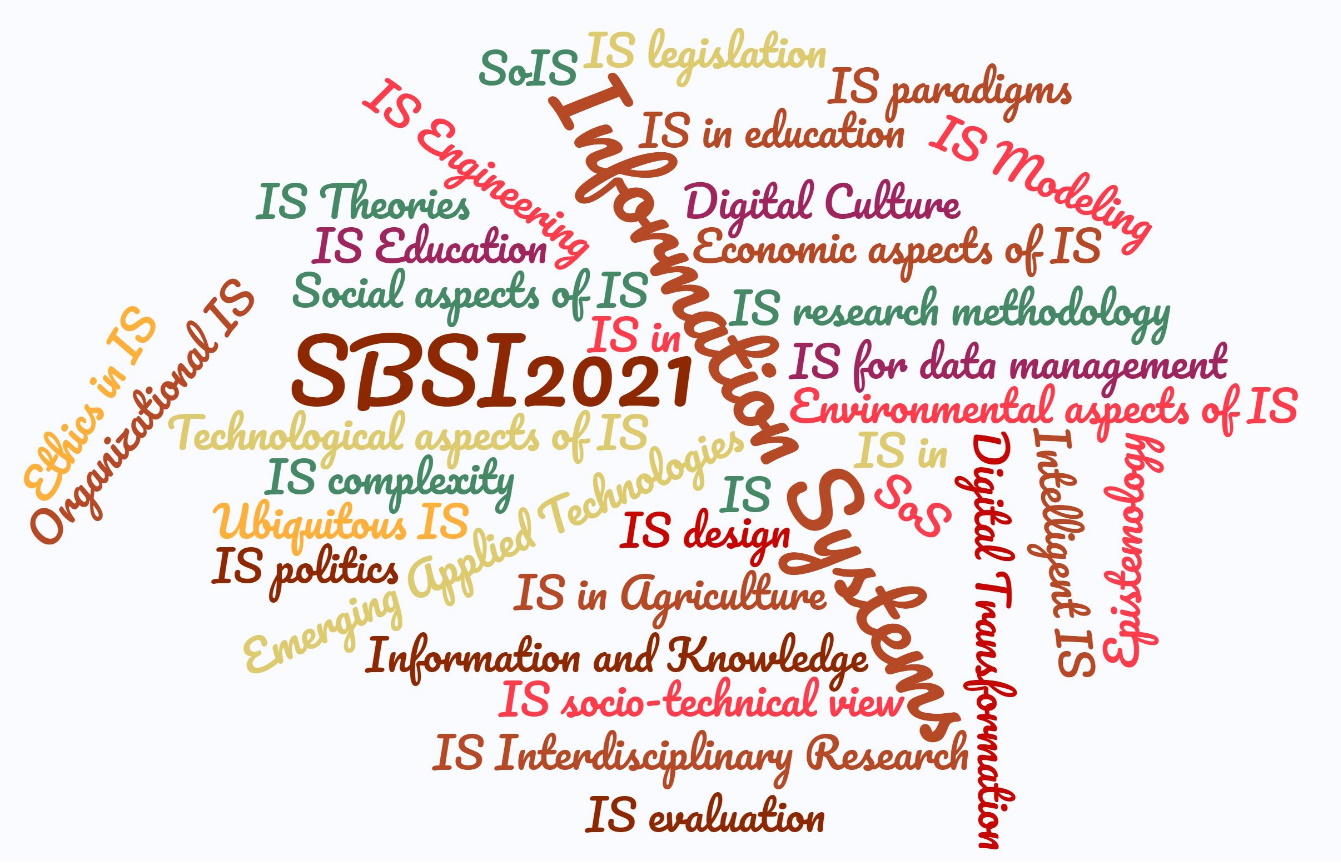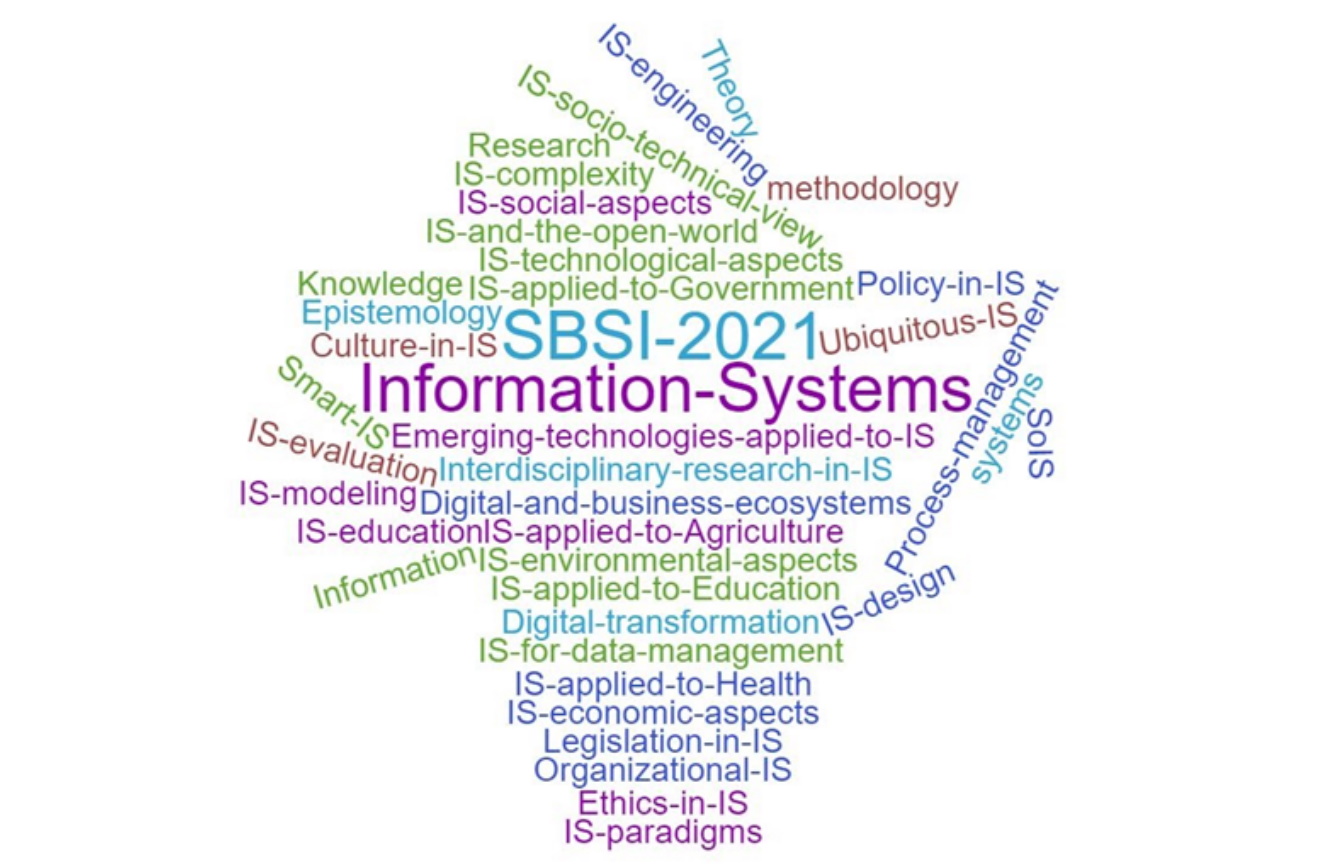MAIN TRACK
Important information and dates about the main track.

Description
The Information Systems (IS) area seeks solutions to problems in the real world, society and organizations, through new technologies. The Brazilian Symposium on Information Systems (SBSI) is the annual meeting of the IS community in Brazil, constituting an event for the presentation and discussion of contemporary topics in the IS area, bringing together students, researchers, professionals, business people, government and society in general to promote the dissemination of research and innovation results. It is promoted by the Information Systems Special Committee (CESI) of the Brazilian Computer Society (SBC)
In its 17th edition, SBSI 2021 is taking place virtually, under the coordination of the Faculty of Computing (FACOM) of the Federal University of Uberlândia (UFU) Uberlândia, Minas Gerais , Brazil, and the theme is “Intelligent and Omnipresent Information Systems: new challenges and opportunities.” The theme refers to the challenges and opportunities that IS have brought to different areas of society, not only to “inform”, but to provide intelligent tools to support decision making and that is always present in the daily lives of people providing relevant and quality information, processed from heterogeneous data. Especially in times of crisis, information systems play a fundamental role in society to assist in facing difficulties. In addition to enhancing and leveraging business, they can anticipate and provide subsidies to deal with unexpected situations and promote more efficient and transformative management in the most diverse areas, such as health, education, logistics, agribusiness, finance, public management, among others. Thus, the proposal is to discuss the new challenges that IS have faced and the opportunities that unexpected and emergency situations bring to the application of technology and the promotion of quality information as an ally in our daily lives, with the use of a computing apparatus that different areas of computing provide.
For the main track of SBSI 2021, we expect scientific papers to clearly present new contributions to the research, all in the area of Information Systems. In particular, we invite the community to take a position on the central theme of the event and the topics of interest.
Topics of Interest
- Theory, epistemology and methodology of research in information systems
- Technological, social, economic and environmental aspects and impacts of information systems
- Management of organizational information systems and processes
- Challenges of information systems applied to domains (Health, Agriculture, Government, Education, among others)
- Information systems for data, information and knowledge management
- Systems-of-Information Systems
- Information systems and the open world
- Sociotechnical view of information systems
- Paradigms, modeling, design, engineering and evaluation of information systems
- The complexity of information systems
- Interdisciplinary research in information systems
- Education in information systems
- Emerging technologies applied to information systems
- Ethics, culture, legislation and policy in information system
- Digital and business ecosystems
- Intelligent and Omnipresent Information Systems: new challenges and opportunities
Important dates:
- Paper submission (briefing and paper):
Nov 22, 2020Dec 06, 2020Feb 06, 2021 - 1st evaluation stage (briefing) - Authors’ notification:
Feb 1st, 2021Mar 08, 2021 - 2nd evaluation stage (paper) - Authors’ notification:
Mar 15, 2021Apr 23, 2021 - Camera ready:
Mar 28, 2021May 07, 2021 - Deadline for registration of at least one author per paper: May 05, 2021
- Submission of presentation video links (as instructed): May 17, 2021
- SBSI 2021 dates: June 07-10, 2021
Authors’ guidelines
Considering that the main area of interest of SBSI is the Information Systems domain, the authors of papers submitted to the SBSI main track must follow these recommendations:
-
The papers must clearly highlight the context of the reported research, considering that research in the Information Systems area involves People, Procedures (also seen as Organizations, when focusing on IS in Organizations) and Technologies. The paper must clearly point out the domain of application and problem (organizational, social) addressed by the work.
-
Authors must indicate the topics of interest to SBSI 2021 and, if applicable, should also indicate whether the reported research has the themes and contributions related to the Great Research Challenges in Information Systems in Brazil 2016-2026.
-
In the introduction, be sure to highlight the motivation for the work, the research problem, the general and specific objectives, the contribution and its scientific originality, presenting the justification and relevance of the work.
-
The research community in Information Systems has increasingly understood the importance of contributing to the existing theoretical framework in the area. Therefore, it is suggested that the authors explicitly present the theoretical foundation considered in the research work. TheorizeIt.org Portal, for example, gathers the main theories used in research in Information Systems.
-
SBSI papers must position the work presented concerning related works published in the specialized literature, showing the need for a new approach or the improvement of an existing one. Some journals and scientific events in the area, which can serve as a basis for your research are (non-exhaustive list): SBSI - Brazilian Symposium on Information Systems , iSys - Brazilian Journal of Information Systems , MISQ - Management Information Systems Quarterly , ISJ - Information Systems Journal , BISE - Business & Information Systems Engineering , IPM - Information Processing & Management , IS - Information Systems , KAIS -Knowledge and Information Systems , TEIS - Enterprise Information Systems , IJWIS - International Journal of Web Information Systems , AMCIS - Americas Conference on Information Systems , ECIS - European Conference on Information Systems , ICIS - International Conference on Information Systems , HICSS - Hawaii International Conference on System Sciences.
-
SBSI papers must clearly describe the scientific methodology employed. Thus, the authors must present (i) the research approach (quantitative research, qualitative research), (ii) the epistemological position (positivist, interpretive, critical), (iii) the research method(s) (experiment, case study, action research, etc.), (iv) the purpose (explain, explore or describe the phenomenon), (v) the data collection technique(s) (questionnaire, interview, direct observation, historical documents, etc.) and (vi) the technique(s) of data analysis (statistical analysis, content analysis, discourse analysis, etc.).
-
The papers must present the analysis of the results, highlighting the contributions of the research and innovation in IS and for the application area, positioning it regarding other works in the area. Authors must describe the results objectively, relating to the problem and research objectives. The limitations of the research and future work should also be indicated.
-
Review the text according to the language used and the formatting. The text must be carefully reviewed concerning its wording, and must be clear, objective and contain no language errors. Review the formatting according to ACM's rules and paper templates ,as well as citation and references formats. Figures and tables must be legible.
Submission instructions
There is only one paper submission category to the SBSI main track: “full paper”. Each submission must include two files:
-
A paper briefing, which describes the work, with a maximum of 2 pages, following the Template for Paper Briefing. This form will be used in the first evaluation stage and will determine whether the paper will be evaluated in the second stage of the process. It is recommended to use the paper briefing as a basis for preparing the full paper.
-
The full paper, corresponding to research work already concluded, based on the scientific literature, with innovative ideas and results, and following an adequate scientific methodology, containing between 7 and 8 pages (including figures, tables, diagrams, references and annexes), following the ACM Proceedings Template.
All papers can be submitted in Portuguese or English, in PDF format and and following the two column
format for ACM conferences (ACM_SigConf), available at
ACM SIG Proceedings Template
.
The use of LaTex is strongly recommended. LaTeX users must use the acmart.cls class provided in the
template with the conference format enabled in the preamble of the document:
\documentclass[sigconf]{acmart}
Authors should use the ACM-Reference-Format.bst bibliography style also provided in the model:
\bibliographystyle{ACM-Reference-Format}
If the authors choose to use the Word format, then be aware that the two-column version (Interim
Template) must be used for submission. However, this is an outdated version of the ACM and, if the paper
is accepted, the authors will have to move to the new simple column template (Submission Template, from
Word Template Workflow) and deal with macro errors when importing into the system until the version of
the paper is correct and validated.
Submissions must be made on
SBC's JEMS platform
. English submissions are recommended.
Papers written in Portuguese must have a title and an abstract in English. Papers that do not follow
the required template will be rejected.
In the submission version of the paper, THE TEXT HEADER MUST NOT HAVE ANY KIND OF AUTHORS’ IDENTIFICATION. In addition to eliminating the authors’ identification from the paper header, all references that may identify the provenance of the paper must be removed from the submission version. Examples of such references are the name of projects, institutions, tools, URLs and citations of papers that identify the authors. Papers with any kind of identification in the submission files will be rejected.
Submissions will be rejected and removed from the evaluation process in the following cases:
- do not present the paper briefing
- present a paper briefing with more than 2 pages
- present a paper briefing that does not follow the required template
- do not present the manuscript
- present a manuscript with more than 8 pages
- present a manuscript with less than 6 pages
- present a manuscript that does not follow the required two-column ACM template
- manuscript and/or paper briefing present any identification of the authors throughout the text
Additional aspects to be observed
-
Paper submission implies that the work described has not been previously published, that it is not under consideration for publication and will not be submitted anywhere else while it is in the process of being evaluated by SBSI. Additionally, the publication must be approved by all authors and, tacitly or explicitly, by the responsible authorities where the work was carried out. A work published on SBSI must not be published elsewhere in the same way, in any other language, including electronically.
-
An author must not publish manuscripts describing essentially the same research in more than one primary publication journal/conference. Submitting concurrently the same manuscript to more than one journal/conference constitutes unethical behavior and is unacceptable. Papers that fit this condition will be excluded from publication in the annals, and this decision cannot be appealed.
-
Authors must ensure that they have written entirely original works, and if they have used the work or excerpts from others, that this has been properly cited or referenced. Plagiarism, in all its forms, is unethical and unacceptable. Papers that fit this condition will be excluded from publication in the Proceedings. ACM policies regarding plagiarism, misrepresentation and forgery should be considered: https://www.acm.org/publications/policies/plagiarism-overview
-
All authors should have made substantial contributions to any of the following items: (1) the conception and design of the study, or data acquisition, or data analysis and interpretation; (2) elaboration of the paper or critical review for important intellectual rights; (3) final approval of the version to be submitted.
-
One should identify who provided financial support for conducting the research and preparing the paper, and briefly describe the role of the sponsor(s), if any, in the study design; in the collection, analysis and interpretation of data; in the elaboration of the paper; and in the decision to submit the paper for publication. If the funding source(s) did not have such involvement, then this must be stated.
JEMS Submission
Submissions must be made on SBC's JEMS platform: https://jems.sbc.org.br.
The submission deadline is Feb 06, 2021 (Saturday). Submissions can be changed in JEMS until 23:59 on Febr 07, 2021 (Sunday).
Review procedures
The selection of works will be carried out based on the review by members of the SBSI Program Committee. The review process will be conducted in a double-blind manner.
In the first evaluation stage, the paper briefing will be evaluated. Only for works approved in this stage, the respective papers will be evaluated in the second stage.
The following criteria will be considered in the review:
- Adequacy to the scope of the SBSI;
- Relevance of the problem;
- Bibliographic review in IS;
- Theoretical foundation;
- Originality of the solution in IS;
- Scientific methodology;
- Contribution to the Information Systems area;
- Quality of writing.
Presentation and publication of accepted papers
Authors must include their data (names, affiliations and e-mails, as well as other information necessary for the paper, such as citations to other authors’ works and data from the publication) in the final version of accepted works.
Along with the final version, the authors of the accepted papers will be asked to send a 2-3 minute pitch video of the paper (a very concise presentation to attract the audience's attention to read their work and watch the full presentation during the event).
ACM will contact the authors to register the copyright, which is also a requirement for publication of the paper.
Accepted papers will be published in the SBSI proceedings, subject to registration, of at least one of the authors in the event, with the inclusion of the publication fee for the main track. Also, the authors are required to make the presentation of the paper during the event. Authors who are SBC members must be up to date with the annuity to be entitled to reduced amounts.
Awards
There will be an award certificate for the three best works published in SBSI 2021.
Authors of the best papers in SBSI 2021 will be invited to submit extended versions of their papers to iSys - Brazilian Journal of Information Systems.
Program Committee for the 1st evaluation stage
- Andre Pimenta Freire (UFLA)
- Andrea Magalhães Magdaleno (UFF)
- Awdren Fontão (UFMS)
- Claudia Cappelli (UFRJ)
- Davi Viana (UFMA)
- Fabiano Dorça (UFU)
- Fabio Gomes Rocha (UNIT)
- Flávio Eduardo Aoki Horita (UFABC)
- Heitor A. X. Costa (UFLA)
- Jonice de Oliveira Sampaio (UFRJ)
- José Maria David (UFJF)
- Leonardo Guerreiro Azevedo (IBM)
- Marcelo Fornazin (UFF)
- Rafael Dias Araújo (UFU)
- Renata Mendes de Araujo (UPM)
- Rita Suzana Pitangueira Maciel (UFBA)
- Rodrigo Santos (UNIRIO)
- Sean Wolfgand Matsui Siqueira (UNIRIO)
- Scheila de Ávila e Silva (UCS)
- Valdemar Vicente Graciano Neto (UFG)
Program Committee for the 2nd evaluation stage
- Alexandre Cidral (Universidade da Região de Joinville)
- Alexandre Graeml (Universidade Tecnológica Federal do Paraná)
- Alexandre L'Erario (Universidade Tecnologica Federal do Parana)
- Aline Vasconcelos (Instituto Federal de Educação, Ciência e Tecnologia Fluminense)
- Ana Grasielle Corrêa (Universidade Presbiteriana Mackenzie)
- Ana Paula Bacelo (PUCRS)
- Ana Paula Serra (Universidade São Judas Tadeu)
- Ana Regina Rocha (COPPE/UFRJ)
- Andre Freire (Universidade Federal de Lavras)
- Andre Menolli (UENP - Universidade Estadual do Norte do Paraná)
- Andrea Magdaleno (UFF)
- Angelica Dias (UFRJ)
- Anna Beatriz Marques (Universidade Federal do Ceará)
- Antonio Resende (Universidade Federal de Lavras)
- Ariel Teles (Instituto Federal do Maranhão)
- Awdren Fontão (Federal University of Mato Grosso do Sul)
- Érica Souza (Universidade Tecnológica Federal do Paraná (UTFPR))
- Bernadette Loscio (Universidade Federal de Pernambuco)
- Bernardo Estácio (Farfetch)
- Bruna Diirr (Universidade Federal do Estado do Rio de Janeiro)
- Carina Alves (Universidade Federal de Pernambuco Recife)
- Carla Merkle Westphall (UFSC)
- Carlos Eduardo Santos Pires (Federal University of Campina Grande)
- Celia Ralha (University of Brasilia)
- Claudia Cappelli (UFRJ - Universidade Federal do Rio de Janeiro)
- Claudio de Farias (Universidade Federal do Rio de Janeiro)
- Cristiano Maciel (Universidade Federal de Mato Grosso - UFMT)
- Cristina Cerdeiral (UNIRIO)
- Daniel Callegari (PUCRS - Pontifícia Universidade Católica do Rio Grande do Sul)
- Daniel Notari (UCS)
- Daniela Barreiro Claro (Federal University of Bahia)
- Daniela Cunha (Mackenzie Presbiterian University)
- Davi Viana (Universidade Federal do Maranhão)
- Debora Paiva (Universidade Federal de Mato Grosso do Sul)
- Diego Garcia (UFOP)
- Dimas C. Nascimento (Universidade Federal Rural de Pernambuco (UFRPE))
- Edna Canedo (Universidade de Brasília - UNB)
- Edson OliveiraJr (Universidade Estadual de Maringá)
- Eldânae Nogueira Teixeira (COPPE/UFRJ)
- Eliomar Lima (Federal University of Goiás)
- Emanuel Coutinho (Universidade Federal do Ceará (UFC))
- Fabiano Dorça (Universidade Federal de Uberlândia - UFU)
- Fabio Lopes (Universidade Presbiteriana Mackenzie)
- Fabio Rocha (Universidade Tiradentes(UNIT); Instituto de Tecnologia e Pesquisa - ITP)
- Fernanda Campos (Universidade Federal de Juiz de Fora)
- Flavia Santoro (UERJ)
- Flavio Horita (Universidade Federal do ABC)
- Frank Siqueira (UFSC)
- George Valença (Universidade Federal Rural de Pernambuco)
- Gian Berkenbrock (Universidade Federal de Santa Catarina)
- Giseli Lopes (UFRJ)
- Glauco da Silva (Centro de Análises de Sistemas Navais(CASNAV) - Universidade Federal Fluminense -UFF)
- Gleison Santos (Unirio)
- Guilherme Galante (Universidade Estadual do Oeste do Paraná)
- Heder Bernardino (UFJF)
- Heitor Costa (Federal University of Lavras)
- Isabel Cafezeiro (UFF)
- Isabela Gasparini (Universidade do Estado de Santa Catarina (UDESC))
- Ivan Machado (Universidade Federal da Bahia)
- Ivonei Freitas Silva (UNIOESTE)
- Jéssyka Vilela (Universidade Federal de Pernambuco)
- Jefferson Elbert Simões (Universidade Federal do Estado do Rio de Janeiro (UNIRIO))
- João Luiz Bernardes Júnior (USP)
- Johnny Marques (Instituto Tecnológico de Aeronáutica)
- Jonice de Oliveira Sampaio Oliveira (DCC/IM/UFRJ)
- Jorge Barbosa (Unisinos)
- Jorge de Abreu Soares (CEFET/RJ)
- José Maria David (Universidade Federal de Juiz de Fora)
- Josiane Kroll (PUCRS)
- Juliana França (Universidade Federal Rural do Rio de Janeiro)
- Juliano Lopes de Oliveira (Universidade Federal de Goiás)
- Julio Dos Reis (Instituto de Computação da Universidade Estadual de Campinas)
- Kate Revoredo (WU)
- Kleinner Farias (Unisinos)
- Leonardo Azevedo (IBM Research - Brazil)
- Leticia Peres (UFPR - Universidade Federal do Parana)
- Lina Garcés (Federal University of Itajubá)
- Lucas Bueno Ruas Oliveira (Federal Institute of São Paulo - IFSP)
- Luciana Salgado (UFF)
- Marcelo Eler (Universidade de São Paulo)
- Marcelo Fantinato (University of São Paulo - USP)
- Marcelo Fornazin (Universidade Federal Fluminense)
- Marcelo Yamaguti (PUCRS)
- Marcelo Iury S . Oliveira (Universidade Federal Rural de Pernambuco)
- Marcos Chaim (Universidade de São Paulo)
- Maria Istela Cagnin (UFMS - Universidade Federal de Mato Grosso do Sul)
- Maxwell Guimarães de Oliveira (Universidade Federal de Campina Grande)
- Mário Menezes (Instituto de Pesquisas Energéticas e Nucleares - IPEN-CNEN/SP)
- Melise Paula (Universidade Federal de Itajuba)
- Melquizedequi Cabral dos Santos (Instituto Federal do Sertão Pernambucano - IFSERTÃO-PE)
- Methanias Colaço Júnior (UFS)
- Michele Brandão (IFMG)
- Monica Anastassiu (Universidade Federal do Estado do Rio de Janeiro)
- Morganna Diniz (UNIRIO)
- Orlando Coelho (Universidade Presbiteriana Mackenzie)
- Patricia Vilain (Universidade Federal de Santa Catarina)
- Paulo Parreira Júnior (Universidade Federal de Lavras)
- Paulo Sérgio Santos (Federal University of the State of Rio de Janeiro)
- Pedro Nuno Moura (UNIRIO)
- Rafael Araújo (Universidade Federal de Uberlândia - UFU)
- Rafael Escalfoni (Centro Federal de Educação Tecnológica Celso Suckow da Fonseca CEFET-RJ)
- Raimundo Moura (Universidade Federal do Piaui)
- Raquel Pillat (Universidade Federal do Rio de Janeiro)
- Raul Wazlawick (UFSC)
- Reinaldo Braga (Instituto Federal do Ceará - Campus Aracati)
- Renata Araujo (Universidade Presbiteriana Mackenzie)
- Renata Teles Moreira (Universidade Federal de Lavras)
- Renato Fileto (UFSC)
- Renato Novais (IFBA - Instituto Federal de Educação, Ciência e Tecnologia da Bahia)
- Ricardo Choren (IME / RJ)
- Ricardo Linden (Faculdade Salesiana Maria Auxiliadora)
- Rita Suzana Pitangueira Maciel (Universidade Federal da Bahia)
- Robson Fidalgo (Universidade Federal de Pernambuco)
- Rodolfo Resende (UFMG)
- Rodrigo Monteiro (UFF)
- Rodrigo Santos (UNIRIO)
- Rogério de Carvalho (Instituto Federal Fluminense)
- Ronaldo Mello (Universidade Federal de Santa Catarina)
- Ronney Moreira de Castro (Universidade Federal do Estado do Rio de Janeiro)
- Sandro Ronaldo Bezerra Oliveira (Universidade Federal do Pará)
- Sarajane Peres (Universidade de São Paulo)
- Saulo Villela (Universidade Federal de Juiz de Fora)
- Scheila de Avila e Silva (Universidade de Caxias do Sul)
- Sean Siqueira (Universidade Federal do Estado do Rio de Janeiro - UNIRIO)
- Sergio Manuel Serra da Cruz (Universidade Federal Rural do Rio de Janeiro)
- Sergio T. Carvalho (Universidade Federal de Goiás - UFG)
- Sofia Paiva (UFSJ)
- Sylvio Barbon Junior (Universidade Estadual de Londrina)
- Tadeu Classe (Universidade Federal do Estado do Rio de Janeiro)
- Taisa Goncalves (Federal University of Rio de Janeiro)
- Toacy Oliveira (COPPE/UFRJ)
- Valdemar Vicente Graciano Neto (Universidade Federal de Goiás)
- Vanessa Nunes (SE7Ti - Tecnologia e Inovação)
- Vaninha Vieira (Universidade Federal da Bahia)
- Victor Stroele (Federal University of Juiz de Fora)
- Wylliams Santos (University of Pernambuco)
Additional Reviewers for the 2nd evaluation stage
- Alexis Huf (Federal University of Santa Catarina)
- Alice Barbosa (Instituto Federal de Educação, Ciência e Tecnologia do Ceará)
- Anthony Accioly (University of Sao Paulo)
- Eveline Sacramento (Ceará State's Foundation for Meteorology and Water Resources)
- Flávia Beppu (Universidade Federal de Mato Grosso)
- Francisco Medeiros (Instituto Federal de Educação, Ciência e Tecnologia do Ceará)
- Gislaine Camila Leal (Universidade Estadual de Maringá)
- Isabel Villanes (Federal University of Amazonas)
- Ivan Salvadori (Federal University of Santa Catarina)
- Jamile Santos (Universidade Federal do Rio de Janeiro - UFRJ)
- Jorge Barbosa (Unisinos)
- Luis de Lima (Universidade Federal do Paraná)
- Marcelo Tibau (UNIRIO - Universidade Federal do Estado do Rio de Janeiro)
- Mateus de Monteiro (Universidade Federal Fluminense)
- Matheus Soares Silva (University of Sao Paulo)
- Maurício Souza (Universidade Federal de Lavras - UFLA)
- Nicolas Hamparsomian (Universidade de São Paulo)
- Ricardo Geraldi (Pontifícia Universidade Católica do Paraná - PUCPR)
- Sírius Thadeu Ferreira da Silva (Universidade Federal do Rio de Janeiro - UFRJ)
- Vanessa Machado (Instituto Federal Rio-Grandense)
- Vanessa Souza (Universidade Federal de Itajubá)
- Waldir Moura (Universidade Federal do Rio de Janeiro)
SBSI 2021 Program Committee Chairs:
Renata AraujoUniversidade Presbiteriana Mackenzie (UPM)/PPgSI-EACH-USP
renata.araujo (at) mackenzie (dot) br
Sean Siqueira
Universidade Federal do Estado do Rio de Janeiro (UNIRIO)
sean (at) uniriotec (dot) br
SBSI 2021 Publication Chair:
Awdren FontãoUniversidade Federal do Mato Grosso do Sul (UFMS)
SBSI 2021 General Chairs:
Rafael D. AraújoUniversidade Federal de Uberlândia (UFU)
rafael (dot) araujo (at) ufu (dot) br
Fabiano A. Dorça
Universidade Federal de Uberlândia (UFU)
fabianodor (at) ufu (dot) br



